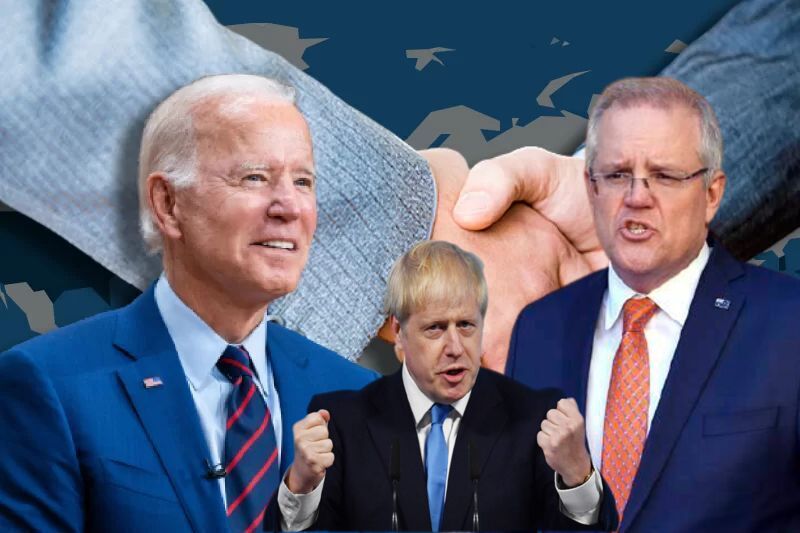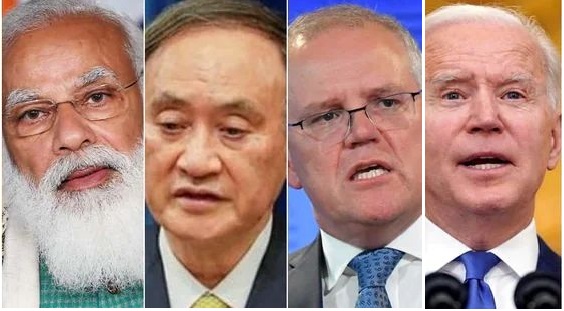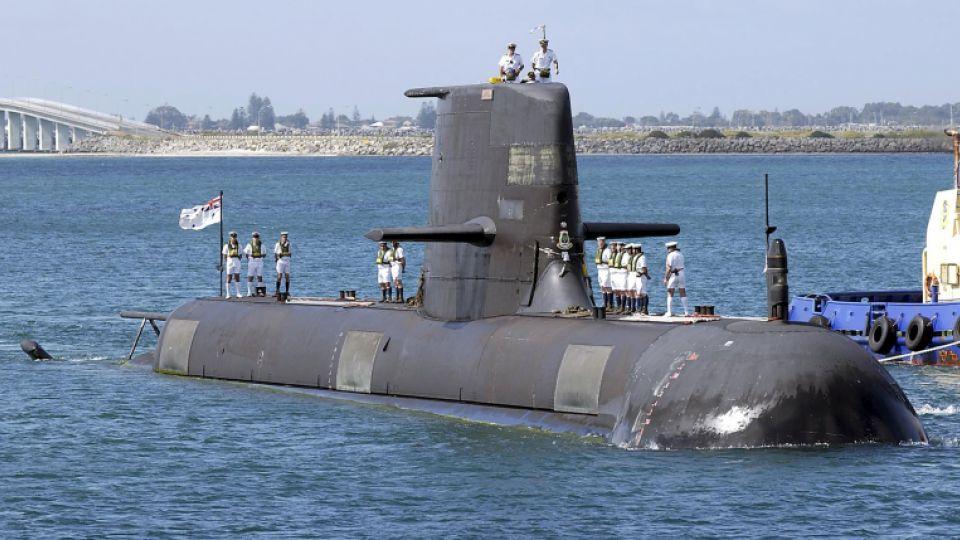
Just days ahead of the first Quadrilateral Security Dialogue (QSD, also known as the Quad) between India, the United States, Japan, and Australia, US President Joe Biden, Prime Minister Boris Johnson, and Prime Minister Scott Morrison of Australia dropped a bombshell with the announcement of another alphabet soup of acronym named AUKUS.
The formation of AUKUS is to help the Southern hemisphere behemoth to get its hands on eight nuclear-powered submarines with America sharing its time-tested technology to balance the Pacific with the aim not to arm the new subs with nuclear weapons which one must take with a pinch of salt. But for Australia, this new deal means that it will now have access to information & technology sharing, integration of security in defense-related science, and supply chains.
The formation of a defense pact between these three Anglo-Saxon colonial powers who are only divided by a common language sent policy wonks and geo-strategic analysts into a tizzy and China called this new grouping an “Obsolete cold war zero sum mentality and narrow-minded geopolitical concepts”.
Zhao Lijian, the Chinese Foreign Ministry spokesperson called this decision to give Australia – a non-proliferation treaty signatory – nuclear technology, a case of “extremely irresponsible” double standards. However, it is very rich coming from China which for years has violated the nuclear non-proliferation treaty and is actually responsible for helping Pakistan, a rogue terror-contributing state with nuclear weapons and delivery systems in the form of ballistic missile technology. Lijian ended his briefing by saying that in the end these three nations, “will only end up shooting themselves in the foot,”.
Zhao Lijian, the Chinese Foreign Ministry spokesperson called this decision to give Australia – a non-proliferation treaty signatory – nuclear technology, a case of “extremely irresponsible” double standards.
However, the leaders of these three countries did not say a word on China, which has ambitions in the Pacific region, the Indian Ocean and wants complete hegemony over the South China Sea, which according to China is its historical right.
The other aggrieved party is France which said that AUKUS is like getting “stabbed in the back” by Australia, disregarding diplomatic niceties because France just lost the multi-billion dollar contract to build 12 conventional submarines for Australia to replace its aging Collins-class diesel-electric submarines. However, it seems Australia did give India a fair warning of the new development but after the announcement of getting eight nuclear-powered submarines with the help of the US and the UK, Jean-Yves Le Drian, France’s Foreign Affairs Minister said, “We had established a trusting relationship with Australia, and this trust was betrayed. This is not done between allies,”.
In fact, France is so incensed that it has recalled its ambassador from the US and Australia.
For France, it is not only a financial loss but also a strategic loss. French defense manufacturers were hoping for a long-term profitable deal and secondly, France now feels it is excluded from the Indo-Pacific as the UK makes a dramatic entrance at its expense. Though France is part of the North Atlantic Treaty Organisation (NATO) it has always exercised an independent military policy within reason.
However, it may now exercise more strategic autonomy alongside Germany which also has the capability to manufacture state-of-the-art weapons platforms and it could lead to both nations forming an alliance.
In an opinion piece published in Politico the current German Defence Minister Annegret Kramp-Karrenbauer said, “coalitions of the willing could act after a joint decision of all EU members and the illusions of European strategic autonomy must come to an end as Europeans will not be able to replace America’s crucial role as a security provider”.
It must be noted that the UK leaving the European Union (EU) has created a lot of problems for them on the domestic/economic front and one could make the argument that the UK sought the American help to bail it out of a complicated situation. Also, when the UK was part of the EU it never embraced the Euro and kept its English Pound to maintain its identity.
UK leaving the European Union (EU) has created a lot of problems for them on the domestic/economic front and one could make the argument that the UK sought the American help to bail it out of a complicated situation.
Also, before everyone starts to yell Quad is finished, it seems Australia did inform India about this new development but kept France in the dark. As per reports, Australia and India’s Prime Minister Scott Morrison, Foreign Minister Marise Payne and Defence Minister Peter Dutton spoke with Prime Minister Narendra Modi, S. Jaishankar, Rajnath Singh about the new partnership.
Why AUKUS is good for India

It is strange that the nations that are most upset over the formation of AUKUS are first-world countries with advanced industrial bases and have access to world-class technology and have their own robust foreign policy. But France, Germany, and Japan, an important country in the Pacific the US have let down and it started during the time of the Obama administration, all have long term defense pact with the US.
It is quite possible that the US sees NATO as the relic of the Cold War and wants to recalibrate its priorities to the Indo-Pacific which it has publicly admitted after it left Afghanistan as Russia is no longer a threat to Europe which was the foundation of this pact. Just as for India the Non-Aligned Movement is now the relic of the Cold War, why not see this as a shift in priorities as foreign policies are not formed on the basis of emotions or morals.
As far as India and the Quad which many think the US and maybe Australia have abandoned was never a military pact but was created for forging stronger economic ties in the Indo-Pacific. It is ironic that among nuclear power democratic countries only India does not have a defense pact with anyone which gives leverage to have separate arrangements with any nation that suits its interest.
A simple example is the purchase of the S-400 anti-aircraft weapon system from Russia which could have led to sanctions from the US under Countering America’s Adversaries Through Sanctions Act (CAATSA), but nothing happened. Also, India and the US have signed the Basic Exchange and Cooperation Agreement (BECA) that gives us advanced geospatial intelligence and enhances accuracy of automated systems and weapons like missiles and armed drones.
Also, India has signed The Logistics Exchange Memorandum of Agreement (LEMOA) in August 2016 which allows each country to replenish from the other’s bases: access supplies, spare parts, and services from the other country’s land facilities, air bases, and ports, which can then be reimbursed. This agreement is particularly useful for Navy-to-Navy cooperation and it helps India and the US cooperate more closely in the Indo-Pacific and at the same time work on enhancing interoperability between the two militaries.
India also has such agreements with Japan (Acquisition and Cross-Servicing Agreement) and Australia which is at a bilateral level and there are possibilities of other nations like France, Russia, and Vietnam having similar agreements with India.
The other agreement is The Communications Compatibility and Security Agreement (COMCASA) was signed in September 2018 which will allow the US to provide India with its encrypted communications equipment and systems so that Indian and US military commanders can communicate through secure networks.
India also has such agreements with Japan (Acquisition and Cross-Servicing Agreement) and Australia which is at a bilateral level and there are possibilities of other nations like France, Russia, and Vietnam having similar agreements with India as it gives them logistical access in the vast Indian Ocean Region which gives our nation more flexibility.
Let’s face the fact, the Quad will never be a military pact which will lead to more tension with China and we share a very long border and they have made a lot of inroads into our neighborhood, particularly Pakistan and Sri Lanka. Lest we forget Australia for a long time to be on the good side of China did not participate in the Malabar Naval Exercise with the US, India, and Japan after participating in the 2007 edition. Also, under the Congress rule until 2014, the thumb rule was not antagonizing China.

It was only after China imposed sanctions on Australia it decided to come back to Malabar in 2020 which China called a clique group like a sullen teenager who could not get a seat at the popular kid’s table.
However, now we can go to France, Germany, and Japan for our need to have access to sophisticated technology, military or otherwise, and also maintain ties with the US which understands India’s purchasing and spending power.
Lastly, AUKUS is the best thing that could happen to India as China will be spread thin, and even if it ends up having the largest navy in the world, it would still take decades for it to create logistical hubs unlike the US which has bases in Japan, South Korea, and US military already has access to all major Australian Defence Force training areas, northern Australian RAAF airfields, port facilities in Darwin and Fremantle.
And after the promise of helping build eight nuclear submarines for them, it will most likely get the Stirling naval base in Perth that will give clear access to the Indian Ocean. China already has several land disputes with many nations but Australia getting American nuclear submarines is a force multiplier it may have not envisioned in its overall strategy.
For France, the cause of hurt is only about losing a huge defense contract but for China, this is a direct challenge to its authority as it will embolden other countries in the South China Sea like Vietnam, Malaysia, and the Philippines.
AUKUS is a recalibration of priorities and it will most likely lead to the dismantling of NATO as nations across the world have lost all the trust in the US. The dismantling of NATO will have some consequences for Eastern European countries but for America that is Europe’s problem. It could be the rise of Germany and Japan as a major military power with France playing a pivotal role with India reaping benefits from all while stretching China all over the place politically, diplomatically, and militarily with direct implications for China’s economy.
AUKUS is a recalibration of priorities and it will most likely lead to the dismantling of NATO as nations across the world have lost all the trust in the US.
India is now in the position to be friends with everyone and enemies with none, even China. AUKUS could dawn the age of European strategic autonomy and replace America as its security provider. In international relations, it is very dangerous to be in an exclusive relationship as one would have to share the burden which France, Germany, Japan, and Afghanistan just experienced. In Asia, Pakistan is a prime example of a nation that survives on exclusive relationships.
Although Afghanistan did not have a choice, the unreliability of the US as a partner is now completely out in the open and future agreements have to be based on present needs with the freedom to calibrate agreements as issues unravel.
AUKUS has given Germany and Japan reason to again become a military power because the world needs more superpower nations to balance things out as this would give a moment of pause to China and to the US it will now have to think twice as hard before starting a new conflict.
For India, AUKUS releases a lot of pressure from China as it will have to deal with Australia, the UK, and the US not only in the Pacific but also in the Indian Ocean with no liabilities or being accused of having defense partnerships as we can now completely focus on the Indian Ocean and freely pursue our independent foreign policies.
(The opinion expressed are authors own)
Balaji is a freelance writer with an MA in History and Political science and has published articles on defence and strategic affairs and book reviews. He tweets @LaxmanShriram78. Views expressed are the author’s own.
